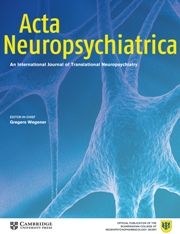
“Several studies have verified the important role of cannabinoid and cannabinoid receptor agonists in tumor progression. However, little is known about the precise role of CB2 expression level in the progression of non-small-cell lung cancer (NSCLC).
The expression of CB2 in NSCLC tissues and corresponding paracancerous tissues was examined using immunohistochemical staining assay.
CONCLUSION:
Our data suggested that targeting CB2 may inhibit the growth and survival of NSCLC cells, which the Akt/mTOR/P70S6K pathway may be involved in. These results confer the pro-oncogenic role of CB2 in the progression of NSCLC, thus improving our understanding of CB2 in tumor progression.”
https://www.ncbi.nlm.nih.gov/pubmed/31176172
https://www.sciencedirect.com/science/article/pii/S0753332219321341?via%3Dihub



 “Bipolar disorder (BD) is a debilitating, lifelong neuropsychiatric illness characterised by unsteady mood states which vacillate from (hypo)mania to depression. Despite the availability of pharmaceutical agents which can be effective in ameliorating the acute affective symptoms and prevent episodic relapse, BD is inadequately treated in a subset of patients.
“Bipolar disorder (BD) is a debilitating, lifelong neuropsychiatric illness characterised by unsteady mood states which vacillate from (hypo)mania to depression. Despite the availability of pharmaceutical agents which can be effective in ameliorating the acute affective symptoms and prevent episodic relapse, BD is inadequately treated in a subset of patients.


 “Although open-label observations report a positive effect of
“Although open-label observations report a positive effect of 
 “Changes in the regulation of endocannabinoid production, together with an altered expression of their receptors are hallmarks of cancer, including colorectal cancer (CRC). Although several studies have been conducted to understand the biological role of the CB1 receptor in cancer, little is known about its involvement in the metastatic process of CRC. The aim of this study was to investigate the possible link between CB1 receptor expression and the presence of metastasis in patients with CRC, investigating the main signaling pathways elicited downstream of CB1 receptor in colon cancer. Fifty-nine consecutive patients, with histologically proven colorectal cancer, were enrolled in the study, of which 30 patients with synchronous metastasis, at first diagnosis and 29 without metastasis. A low expression of CB1 receptor were detected in primary tumor tissue of CRC patients with metastasis and consequently, we observed an alteration of CB1 receptor downstream signaling. These signaling routes were also altered in intestinal normal mucosa, suggesting that, normal mucosa surrounding the tumor provides a realistic picture of the molecules involved in tissue malignant transformation. These observations contribute to the idea that drugs able to induce CB1 receptor expression can be helpful in order to set new anticancer therapeutic strategies.”
“Changes in the regulation of endocannabinoid production, together with an altered expression of their receptors are hallmarks of cancer, including colorectal cancer (CRC). Although several studies have been conducted to understand the biological role of the CB1 receptor in cancer, little is known about its involvement in the metastatic process of CRC. The aim of this study was to investigate the possible link between CB1 receptor expression and the presence of metastasis in patients with CRC, investigating the main signaling pathways elicited downstream of CB1 receptor in colon cancer. Fifty-nine consecutive patients, with histologically proven colorectal cancer, were enrolled in the study, of which 30 patients with synchronous metastasis, at first diagnosis and 29 without metastasis. A low expression of CB1 receptor were detected in primary tumor tissue of CRC patients with metastasis and consequently, we observed an alteration of CB1 receptor downstream signaling. These signaling routes were also altered in intestinal normal mucosa, suggesting that, normal mucosa surrounding the tumor provides a realistic picture of the molecules involved in tissue malignant transformation. These observations contribute to the idea that drugs able to induce CB1 receptor expression can be helpful in order to set new anticancer therapeutic strategies.”